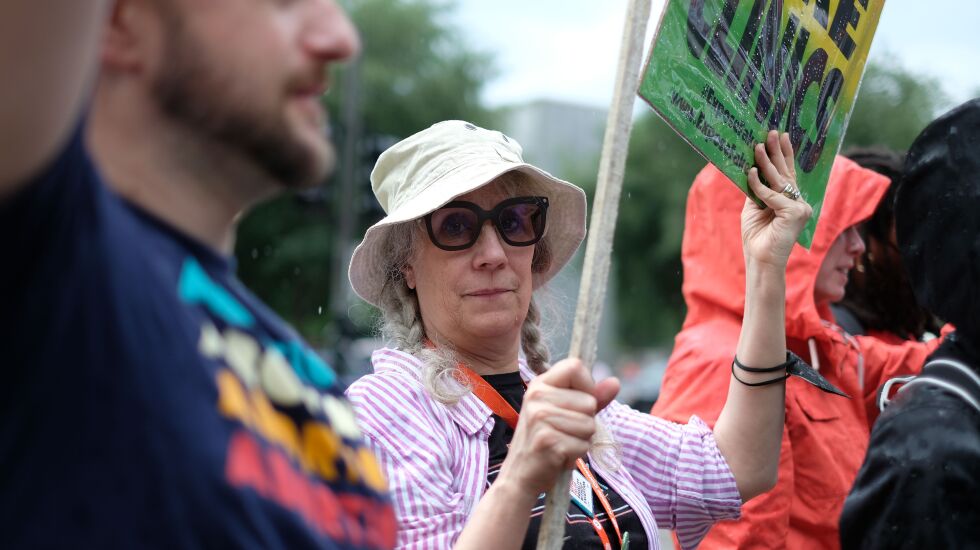
Lizz Winstead was 17, a high school senior in Minnesota.
“I was a Catholic teenager who found myself pregnant, making deals with God and myself,” said Winstead, now 61. “Pregnancy tests weren’t available.”
There was no internet. She saw an advertisement on the side of a bus about free pregnancy tests. She went to the address, an old house, oddly.
“I never forgot it,” she recalled. “There was a person in a lab coat, impersonating a doctor. She gave me a pregnancy test. It was positive, and she pulled out a book with all those pictures of bloody fetuses you see at protests outside clinics. She freaked me out.”
Winstead had stumbled on one of the fake abortion clinics that anti-abortion activists run to lure in young women who fear they are pregnant, so they can be harangued about hellfire and the alleged horrors of a medical procedure far safer than carrying a pregnancy to term.
Nor are these fake clinics a relic of the past — Illinois, despite being a blue peninsula of women’s rights jutting in an angry red lake of Midwestern religious intolerance, has three times as many sham abortion clinics as real ones.
“They’re bigger than ever,” said Winstead, a comedian who went on to co-create “The Daily Show” and, in 2015, started a group that became the Abortion Access Front, which came to Chicago over the weekend to rally in front of one of Illinois’ 97 fake abortion clinics.
The irony is, when teenage Winstead finally got to an actual abortion clinic, she found herself challenged to think about her options in a serious way, far more than the religious trap had done.
“The provider asked different questions, questions that could have gone either way,” she said. “By asking questions that allowed me to self-examine what I wanted, that weren’t judgmental. Answering them, I solidified my decision.”
Which is what the entire shift in this country is about — who makes that decision? The woman whose life is most directly affected? Or fundamentalist strangers eager to force their antique sexual values on everybody else?
Winstead is a comedian, and the Abortion Access Front claims it brings humor to an issue known for supercharged and painfully sincere invective on both sides.
“How’s that going?” I asked.
“People wonder how you can bring humor to the abortion issue,” she replied. “We have been processed to think about abortion, more often than not, all of our unconscious biases about abortion are formed by the anti-abortionists. I don’t believe abortion is murder. I don’t believe people trying to oppress women are looking out for babies. They’re misogynist hypocrites who literally are trying to solidify the patriarchy in our society and need to be ridiculed constantly.”
Testify, sister.
So how can someone tell if a particular clinic is real or fake? Real ones will be direct, saying, “We provide abortion up to 24 weeks” or whatever. Ask them. The fake clinics will be evasive, and say something like, “We discuss reproductive options.”
“If it’s not right there, plain as day, you’ve hit a fake clinic,” Winstead said.
Or you can visit the website Abortion Access Front runs, exposefakeclinics.com.
“It’s a scourge we want to raise awareness about,” she said. “People are in need of emotional support and abortion counseling, and when they get you in there, they tell you abortion is murder, causes breast cancer, mental illness, sterility. Those places provide judgment and shame and misinformation about abortion care.”
Because I had her on the phone, I had to ask — a year after the U.S. Supreme Court pitched Roe vs. Wade, where are we? At the nadir of women’s rights? Or still digging?
“We’ve been working at Abortion Access Front, trying to talk about abortion in different terms, to reframe the abortion debate, in a way that gives it its proper place in health care,” she said. “We need to really empower regular folks to tell their stories, to defend abortion.
“It needs to be more than an individual choice. It needs to be a community good. We need to talk about the way people can control their destiny. We see citizens putting up ballot initiatives saying, ‘No more. If you end access to abortion, I will vote to end your political career.’ We need more people to talk about abortion being central to our health care, our economic freedom. It’s a human rights crisis.”







